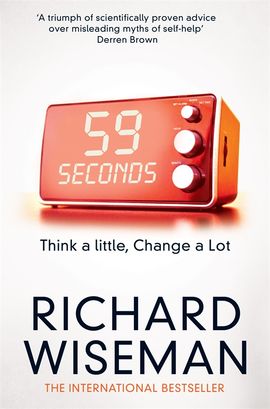gimley reviewed 59 seconds by Richard Wiseman
Review of '59 seconds' on 'Goodreads'
1 star
Why not invest a minute to be happier? Because that's not really what is being offered--that's just the marketing. If we were really doing science, we should follow up with the actual time it would take and statistics on how many readers of this book actually changed their lives
I started reading this for the dubious reason of wanting to see what another author I was reviewing recommended. I'm not an unhappy person, nor a wildly happy one--I'm not really sure what the abstraction "happiness" means even though others are comfortable giving an exact number from 1 to 10. I'd probably be happier if I were one of those others. I'd think less and smile more.
Also, I'm not eager to change anything about myself. One would think the author could understand why. He cites research that people who won the lottery didn't become happier. (Let's ignore for the moment that their experiment didn't control for people who wouldn't ever play the lottery--scientists who understand that it's a tax on those who are bad at math.) My take away from the experiment wasn't the official one--that an influx of cash doesn't create happiness--it was that that people are wrong about what they imagine will make them happy (e.g. winning money). And yet this book regularly assumes the reader knows in advance how they want to change or how they will feel about it afterwards. What about "Be careful what you wish for"?
Since he early on quotes from a Woody Allen movie, let me do the same. In Annie Hall, a happy couple accounts for their success with both people saying "I'm very shallow and empty and I have no ideas and nothing interesting to say." These people are his ideal readership (or would be but they're already happy.) The author doesn't seem to believe that people are complicated--just misinformed on the science.
In one of the first experiments he writes about, the data shows that nursing home residents given a plant to care for reported themselves happier (and lived longer--a rare example of objective data) than those given plants that would be cared for by the staff. I assumed his conclusion would be that an experience of caring makes one happier, but no--it was that giving people more control over their lives makes them happier.
This is science?
How about that attitude of gratitude? (And does repeating those rhyming words really help matters?) I imagine feeling pure unadulterated gratitude must feel great. I have to imagine because for me, gratitude is usually mixed with a host of other feelings. Am I the only one who is complicated this way? Am I supposed to repress the other feelings? No, because that just strengthens them, says the research. Evidently science thinks that people's actual feelings are identical to those expressed on a greeting card. And how can it be better to give than receive when that decrease the opportunities to feel gratitude?
I'm also one of those who believe in what Wiseman calls "the myth of active listening." Science has shown that couples don't have to listen to each other. The presumption of the listening exercises is that members of a couple actually want to empathize with each other. Forcing them to do so against their will isn't really the purpose, but if you think behavioristically, science is only about what you do.
Writing is better than thinking because you organize your thoughts and give them a structure. I always suspected I'd hate a book like this but felt I should give it a chance and now I can hate it in a deeper structured way. I played several games of chess online before writing this review which is supposed to reinforce the logical thought that went into the ideas expressed herein. I just skimmed the last half which may mean I missed the most worthwhile parts but it made me happy to be done with it and isn't happiness the goal?
The research suggests that I'd probably have felt a lot better giving this book more than one star though my actual experience suggests otherwise.

